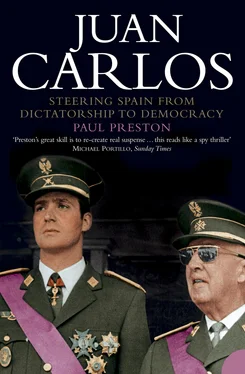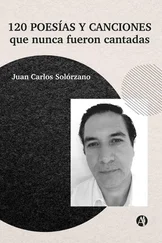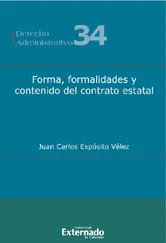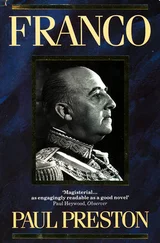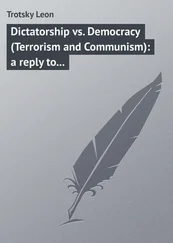If the Menfis dinner annoyed Franco, his outrage at a report from his secret service can be imagined. On the day before the Menfis event, Don Juan had received a group of Spanish students in Estoril. If the report written by one of the students was accurate, it presented either a misplaced attempt at humour or the indiscretions of someone who had had too much to drink at lunch. Allegedly, Don Juan had outlined his conviction that, in the event of Franco’s death, all he had to do was head for the Palacio de Oriente in Madrid. Streams of monarchist generals would ensure that he was not challenged. He would abolish the Falange by decree and allow political parties, including the Socialists. 89 The report goes some way to explaining the contemptuous manner in which Franco referred to Don Juan in private.
The emergence of Unión Española was merely one symptom of unrest within the Francoist coalition. That Satrústegui could get away with such sweeping criticism of the regime suggested that Franco was losing his grip. Certainly, his inability to deal with the economic crisis other than by relinquishing control to his new team of technocrats suggested that his mind was elsewhere. 90 To dampen the speculation about his future, Franco permitted Carrero Blanco and López Rodó to continue their work on the elaboration of a constitutional scheme for the post-Franco succession. It would be called the Ley Orgánica del Estado and would outline the powers of the future King. The first draft was given to Franco by Carrero Blanco on 7 March 1959 together with a sycophantic note urging the completion of the ‘constitutional process’: ‘If the King were to inherit the powers which Your Excellency has, we would find it alarming since he will change everything. We must ratify the lifetime character of the magistracy of Your Excellency who is Caudillo which is greater than King because you are founding a monarchy.’ Once the law was drafted, Carrero Blanco proposed calling a referendum. Once this was won – ‘people will vote according to the propaganda that they are fed’ – ‘we could ask Don Juan: do you accept unreservedly? If he says no, problem solved, we turn to the son. If he also says no, we seek a regent.’ 91
In the wake of the Hotel Menfis affair, Franco was hesitant. He reiterated to Pacón one week later that Don Juan and Prince Juan Carlos must accept that the monarchy could be re-established only within the Movimiento , because a liberal constitutional monarchy ‘would not last a year and would cause chaos in Spain, rendering the Crusade useless. In that way, the way would be open for a Kerensky and shortly thereafter for Communism or chaos in our Fatherland.’ 92 Unwilling to do anything that might hasten his own departure, he did nothing with the constitutional draft for another eight years.
To increase his freedom of action and to put pressure on Don Juan, Franco continued quietly to cultivate Alfonso de Borbón y Dampierre, the son of Don Juan’s brother Don Jaime. Through the deputy chief of his household, General Fernando Fuertes de Villavicencio, an audience was arranged. Franco liked both Alfonso and his brother Gonzalo and discussed the succession question with them. After asking Alfonso if he was familiar with the Ley de Sucesión , he said, ‘I have made no decision whatsoever regarding who will be called in the future to replace me as Head of State.’ Hearing that Alfonso had been received at El Pardo, José Solís Ruiz, Secretary-General of the Movimiento and other Falangists began to promote the idea of meeting the conditions of the Ley de Sucesión with a príncipe azul (a Falangist prince). 93
On 15 September 1958, Juan Carlos would move to the Air Force academy of San Javier in Murcia. He was delighted to be learning to fly and endeared himself to his fellow cadets with his pranks, ably assisted by his pet monkey, Fito, who wore Air Force uniform. Juan Carlos had taught him to salute and shake hands. The relationship with the monkey would see the Prince confined to barracks. Eventually Don Juan obliged him to part company with Fito. 94 In the course of the year, the Prince made a number of gestures aimed at consolidating his links with the regime. In the spring of 1959, while still a cadet at the academy, he took part in Franco’s annual victory parade, to celebrate the end of the Civil War. That he was not treated exactly like all the other cadets may be deduced from the fact that, while in Madrid, he stayed at the Ritz where he received many visitors. At some points of the parade, Juan Carlos was applauded. However, at the Plaza de Colón, a group of Falangists and supporters of the Carlist pretender Don Javier, having arrived from the nearby headquarters of the Falange in the Calle Alcalá, began to insult the Prince and shout ‘We don’t want idiot kings.’ The police stood by without interfering. In order to diminish the hostility of the Falange, in late May 1959, Juan Carlos laid a laurel wreath in Alicante on the spot where José Antonio Primo de Rivera had been executed on 20 November 1936. It was to no avail. The Movimiento daily, Pueblo , criticized him for not visiting the historic sites of Francoism with greater frequency. 95
On 12 December 1959, Juan Carlos’s military training came to an end and he was given the rank of Lieutenant in all three armed services. At the official ceremony at the Zaragoza military academy, the new Minister for the Army, Lieutenant-General Antonio Barroso, in a speech that he had previously submitted for Franco’s approval, paid a special tribute to Juan Carlos and to Queen Victoria Eugenia. Underlining the importance of the occasion for Juan Carlos’s future, Barroso significantly spoke of how ‘your fidelity, patriotism, sacrifice and hard work will compensate you for other sorrows and troubles’. 96 It is not clear whether this was a specific reference to the death of his brother or a more general comment on the situation of a young man separated from his family.
Juan Carlos was now 22 and he had matured during his time in the academies although his tastes were exactly what might have been expected in any young man of his age, particularly an aristocrat – girls, dancing, jazz and sports cars. One of his instructors told Benjamin Welles, a correspondent of the New York Times , ‘He is no older than his actual age.’ 97 Nevertheless, Franco was happy with the progress made by Juan Carlos but ever more distrustful of his father. He told Pacón in early 1960: ‘Don Juan is beyond redemption and with every passing day he’s more untrustworthy.’ When Pacón tried to explain that the Pretender’s objective was a monarchy that would unite all Spaniards, Franco exploded. ‘Don Juan ought to understand that for things to stay as they were during the Second Republic, there was no need for the bloody Civil War … It’s a pity that Don Juan is so badly advised and is still set on the idea of a liberal monarchy. He is a very pleasant person but politically he goes along with the last person to offer him advice … In the event of Don Juan not being able to govern because of his liberalism or for some other reason, much effort has gone into the education of his son, Prince Juan Carlos, who by dint of his effort and commitment has achieved the three stars of an officer in the three services and now is ready to go to university.’ 98
It is curious that while in public, Franco seemed to favour the cause of other pretenders, such as Don Jaime and his son, and the Carlists; in private, he had reduced the choice essentially to one between Don Juan and Juan Carlos. Although he harboured no hope of Don Juan accepting the principles of the Movimiento , he had little doubt in the case of Juan Carlos. The other candidates served both as reserves but also as a way of exerting pressure on Don Juan and his son. Franco’s growing fondness for Juan Carlos was leading him to assume that he could rely on Don Juan to abdicate in favour of his son. It was a vain expectation. Don Juan wrote to Franco on 16 October 1959, reporting on an interview with General de Gaulle, in which they had discussed the future of Spain. He wrote: ‘I believe that if one day, this situation were to be addressed using the present legal arrangements, it is to be hoped that a conflict will not be provoked by a rash attempt arbitrarily to alter the natural order of the succession which both the Príncipe de Asturias and myself are determined to uphold.’ 99 The issue of Juan Carlos’s university education was now about to bedevil even more the relationship between his father and the Caudillo.
Читать дальше
